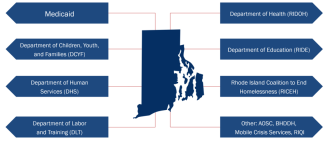Ecosystem
The Rhode Island Ecosystem is an information system developed and operated by the ODAE. It is a one-of-a-kind data utility that honors the ways in which Rhode Islanders are raised by their families, rooted in their communities, and products of their histories. The system acknowledges that individuals’ needs, risks, conditions, outcomes, and drivers of health, wellness, and wellbeing are complicated and unique, yet interconnected. By establishing a technical infrastructure that accepts, cleanses, connects, and de-identifies diverse data sources, the ODAE’s Ecosystem seeks to enhance the understanding of what it means to be a “whole person” in Rhode Island’s rapidly changing environment.
While all data sets included in the Ecosystem are “ingested” (i.e., collected and stored), not all data sets are “integrated” (i.e., linked and unified). For data sets that are ingested and integrated, the ODAE creates a person-level identifier that matches unique individuals across data sets while ensuring Personally Identifiable Information (PII) is eliminated from the underlying system. For data sets that are only ingested – and not integrated – a person-level identifier is similarly established, but only within the data set in which the individuals are found – not across all Ecosystem data sets.
Entities Contributing Data Sets to the Ecosystem
